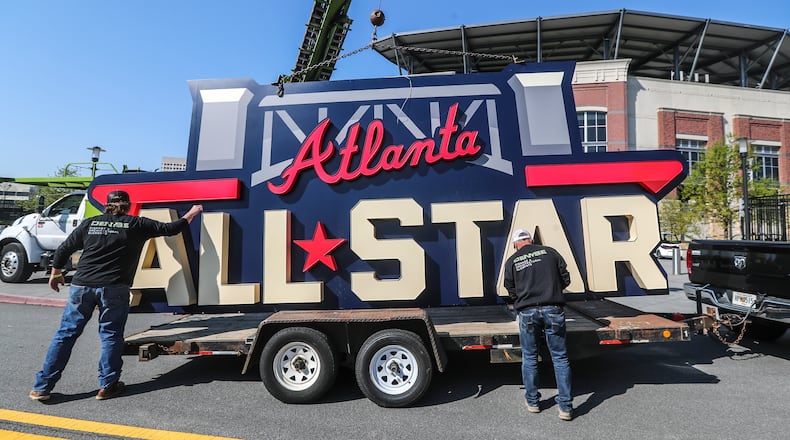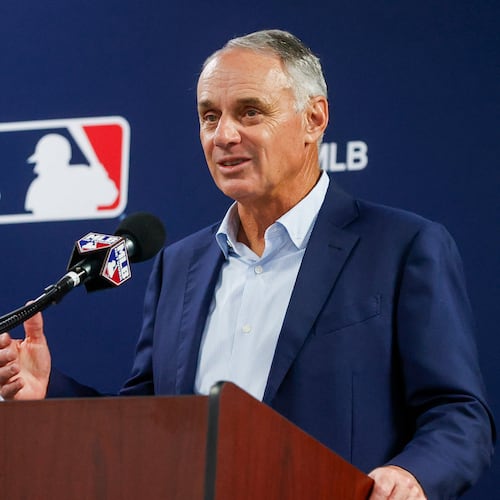When MLB yanked the All-Star Game from Georgia four years ago to protest the state’s new election law, it was more than a scheduling change. It marked a turning point in a national debate over ballot access that had reached a boiling point.
Now, as the game returns to Atlanta for a five-day celebration culminating in baseball’s All-Star showcase, Republicans long exasperated by claims the law was an illegal “Jim Crow 2.0″ that made Georgia a laughingstock are instead claiming vindication.
Gov. Brian Kemp and other Republicans used MLB’s decision to rally conservatives — and put Democrats on defense after metro Atlanta lost a premier event expected to generate tens of millions for the local economy.
Kemp’s office this week framed the game’s return as proof the law’s supporters are on “the right side of history.” Attorney General Chris Carr, who defended the measure in court, said in an interview that the league’s reversal was clear evidence that Georgia made it “easier to vote and harder to cheat.” Even some Democrats who still strongly oppose the changes are welcoming the game’s return.
Still, the fallout from the law is far from resolved. Voting rights groups and Democratic critics say the far-reaching changes have created new barriers for some Georgians to cast their ballots — even amid record-breaking turnout in recent elections.
Georgia NAACP president Gerald Griggs, who opposed MLB’s decision to return the game to Truist Park, said the league should use the platform to spotlight “the fight for justice and equity.”
“While the stars shine on the field, we can’t ignore what’s happening off it here in Georgia: voter suppression, attacks on marginalized communities and efforts to silence voices that have fought too hard to be heard.”
To some Republicans, meanwhile, the game’s return isn’t closure. It’s a call for accountability.
State Rep. Todd Jones, a Forsyth County Republican who helped pass the election law, said MLB commissioner Rob Manfred and other league executives owe the state an apology.
“Let’s face it, we need him to come out and say, ‘On further reflection, I made a mistake and that’s OK.’”
Of boycotts and backlash
How did baseball’s midsummer classic turn into a political football?
It traces back to Georgia’s 2021 election overhaul, championed by Kemp and other Republicans in the wake of Donald Trump’s narrow defeat to Joe Biden in Georgia, which marked the first time a Democrat captured the state in decades.
Credit: TNS
Credit: TNS
The law, Senate Bill 202, restricted the mailing of absentee request forms to voters, capped the number of ballot drop boxes in each county, required an ink signature on absentee applications, required more proof of ID and shortened deadlines to request ballots.
It also left in place three weeks of in-person early voting and preserved no-excuse absentee voting despite intense pressure from Trump allies. Georgia remains one of about two dozen states that allow any voter to cast an absentee ballot for any reason.
Supporters of the legislation call it an unequivocal success, pointing to soaring turnout in recent elections — including a record-setting 5.3 million Georgians who cast ballots in last year’s presidential contest. Rank-and-file Republicans soon embraced Kemp’s one-liner that the law makes it “easier to vote and harder to cheat.”
But that isn’t the whole story. An Atlanta Journal-Constitution analysis found that absentee voters were significantly less likely to return to the polls in the next election than those who voted early or on Election Day in 2020, when the global coronavirus pandemic upended voting habits.
More than 347,000 voters who cast absentee ballots in 2020 didn’t participate in the November 2024 election — a 27% drop in turnout among that group. If those voters had turned out at the same rate as others who cast ballots in 2020, roughly 123,000 more votes would have been recorded.
The law was adopted following the sharply divided contest between Trump and Biden, and it quickly became a rallying cry across the nation for Democrats who demanded federal voting rights protections. Then-President Biden entered the mix when he told ESPN in April 2021 he would “strongly support” a boycott of the game if it stayed in Atlanta.
Credit: TNS
Credit: TNS
Baseball yielded to the pressure in April 2021 — just months before the game — with Manfred making the decision to shift the game to Denver eight days after Kemp signed the voting rules.
“I have decided that the best way to demonstrate our values as a sport is by relocating this year’s All-Star game,” Manfred said then. “Major League Baseball fundamentally supports voting rights for all Americans and opposes restrictions to the ballot box.”
‘A message to all of us’
For Kemp and his Georgia allies, the league’s decision marked a turning point. After months of weathering attacks from Trump over his refusal to overturn the 2020 election, the governor was suddenly recast as a hero to the pro-Trump base.
“This is a message to all of us. They’re coming after you next,” he said on Fox News shortly after the league yanked the game. “They’re going to boycott your business next. We have to stand up.”
And Trump, gearing up for a rematch against Biden, called for his own boycott of America’s pastime — and warned Atlanta-based Coca-Cola and Delta that they could be next after both condemned the law.
(Months later, he backed off his feud with the league and attended Game 4 of the World Series at Truist Park, watching in a suite alongside political allies.)
Credit: TNS
Credit: TNS
Democrats who had opposed the law suddenly had to account for the political pressure that stripped the state of a standout event.
Then-state Rep. Teri Anulewicz, who represented the area around the ballpark during the dustup, was among the Democrats who both opposed the law and criticized the league’s decision to move the game. This week, she said she was thrilled “the baseball universe will finally experience Georgia and Cobb County’s unmatched hospitality.”
But that hasn’t blunted persistent criticism of the law. State Rep. Saira Draper, an Atlanta Democrat and leading voice on election policy, said Georgia’s GOP-led approach has “been driven by feelings, fiction and fear rather than fact” since 2020.
Credit: Arvin Temkar/AJC
Credit: Arvin Temkar/AJC
“Senate Bill 202 was an example of legislation that attempted to mollify election deniers and conspiracy theorists rather than tackle the real problems affecting Georgia voters’ ability to cast a ballot,” Draper said.
Republicans feel vindicated. They pointed to Attorney General Pam Bondi’s decision to drop a challenge by Biden’s administration alleging the Georgia law illegally discriminated against Black voters.
Carr, who plans to attend the game, said he’s relishing the moment.
“The most important thing is we got the game back. That’s a testament to our state, its leadership and the policies we put forth,” he said. “And having the game in Georgia is an acknowledgment that what Democrats said about the law in 2021 was just not true.”
About the Author
Keep Reading
The Latest
Featured








